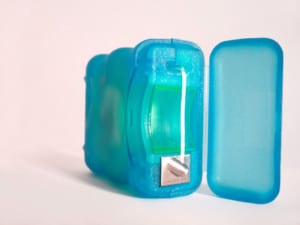Pediatric Dentist Tyler

A Teething Breakdown
Teething generally begins around 6-12 months of age, and can 24 months or more to complete. Each tooth eruption lasts about a week – 4 days before the tooth breaks through, followed by 3 days of healing. During these episodes, it is common to see some minor symptoms. Your child may experience a low-grade fever (around 99.0°F), excessive drooling, chewing obsession, gum irritation and discomfort, and/or a slight facial rash during tooth eruption. These symptoms are all normal and should pass within a few days.
What Teething Doesn’t Cause
While teething may cause the mild reactions listed above, more serious symptoms like those below, are not related to teething:
- Runny Nose
- High Fever
- Vomiting
- Digestive issues (Diarrhea, cramping)
- Coughing
If your child is experiencing any of these symptoms for an extended time, consult your child’s doctor.
Your child should have a dental visit within the first 6 months of tooth eruption. It is important to have examinations done early, so you can start them on a path of life-long oral health. If your child is teething, our team is more than happy to help. Contact our office to schedule an appointment.
2301 S. Broadway, Suite B-10
Tyler, TX 75701
Phone: (903) 531-9000

 Periodontal disease is a bacterial infection in the gums that can impact the teeth and jawbone if left unchecked. About half of all children suffer from periodontal disease. Fortunately, if identified and treated early, its effects can be managed and even reversed to allow your child to return to optimal oral health through adolescence and beyond.
Periodontal disease is a bacterial infection in the gums that can impact the teeth and jawbone if left unchecked. About half of all children suffer from periodontal disease. Fortunately, if identified and treated early, its effects can be managed and even reversed to allow your child to return to optimal oral health through adolescence and beyond. It can be difficult to get your child to practice proper oral care unsupervised. However, the long-term benefits of an early start to optimal oral hygiene are worth the effort. Below are some tips to help you make oral health a fun part of your child’s daily routine.
It can be difficult to get your child to practice proper oral care unsupervised. However, the long-term benefits of an early start to optimal oral hygiene are worth the effort. Below are some tips to help you make oral health a fun part of your child’s daily routine. We’ve all been told at least once in our life that flossing daily is crucial. Here are four reasons why flossing may be beneficial for your oral health routine:
We’ve all been told at least once in our life that flossing daily is crucial. Here are four reasons why flossing may be beneficial for your oral health routine: Our patients love visiting our office. We make it a priority to make sure every child feels safe and comfortable when visiting us. We focus on keeping your children educated and happy with their oral health. Below are a few tips on how to make your child comfortable while visiting the dentist.
Our patients love visiting our office. We make it a priority to make sure every child feels safe and comfortable when visiting us. We focus on keeping your children educated and happy with their oral health. Below are a few tips on how to make your child comfortable while visiting the dentist. The negative effects of poor oral hygiene are well documented, and can impact much more than your mouth. A lot of serious medical conditions can be caused or worsened by complications arising for poor oral health. Starting your child’s oral care off right serves the twofold benefit of modeling the importance of good oral hygiene to them and giving their mouth a solid foundation of oral health. If you want to ensure your child’s oral health is taken care of,
The negative effects of poor oral hygiene are well documented, and can impact much more than your mouth. A lot of serious medical conditions can be caused or worsened by complications arising for poor oral health. Starting your child’s oral care off right serves the twofold benefit of modeling the importance of good oral hygiene to them and giving their mouth a solid foundation of oral health. If you want to ensure your child’s oral health is taken care of,  Calcium is an important mineral for building strong, healthy teeth. Not everyone can tolerate the lactose found in dairy, which is often a prime source for calcium. There are a wide variety of options available to get the calcium you need. Here are six options rich in calcium:
Calcium is an important mineral for building strong, healthy teeth. Not everyone can tolerate the lactose found in dairy, which is often a prime source for calcium. There are a wide variety of options available to get the calcium you need. Here are six options rich in calcium: Keeping up optimal oral health takes more than brushing and flossing. Maintaining oral hygiene demands a bit of work, but it is worth it in the long run. Here are four ways you can improve your dental health right now.
Keeping up optimal oral health takes more than brushing and flossing. Maintaining oral hygiene demands a bit of work, but it is worth it in the long run. Here are four ways you can improve your dental health right now. Calcium is an important mineral for building strong, healthy teeth, but not everyone can tolerate the lactose found in dairy. Lactose is a sugar found in milk and other dairy products. About 65% of people have reduced ability to process lactose past infancy.
Calcium is an important mineral for building strong, healthy teeth, but not everyone can tolerate the lactose found in dairy. Lactose is a sugar found in milk and other dairy products. About 65% of people have reduced ability to process lactose past infancy.